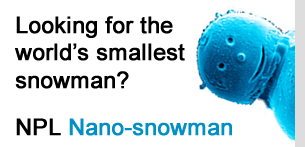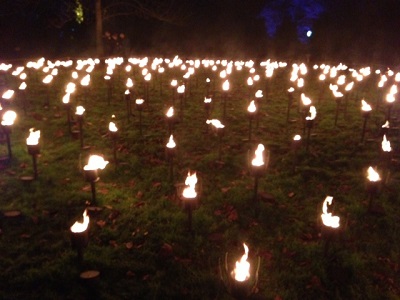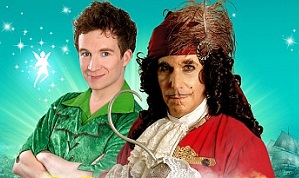
Having taken my daughter to the NPL’s fabulous “Protons for breakfast” series of lectures a few years ago I managed to sign up for tickets to the first Christmas Science Lecture (suitable for kids from 10 years old) – presented in conjunction with Institution of Engineering and Technology and Kingston University – within the 90 minutes it took for them to “sell” out (tickets were free).
While we waited – with over 100 others spanning 10 years to 80 years old - for the 6pm event to start we completed a questionnaire where we had to guess things like the number of sweets in a tin, mints in a jar, number of hot meals we have had and books we had read. Not so easy. These sheets were collected and taken away for immediate analysis.
The first lecture was called “Candles for Christmas” by Dr Michael Podesta – a Chartered Physicist and MBE who led those marvellous protons for breakfast lectures. After considering the molecular structure of wax (how does he manage to make even the most mundane things seem interesting and science so easy to understand?) we were investigating how hot candles burn (over a 1,000 degrees), how much energy and light they produce and – an engineering question – could we do better? Using “ye old USB” he used the candle with a thermoelectric generator to power an electric torch. Great experiments.
Next up was Professor Kevin Warwick who works in cybernetics and artificial intelligence at Reading University talking about “Cyborgs: Ghosts of Christmas Future”. Using phrases like “sensory substitution” and “culturing neurons and enhancement” he won major cool points from the kids for showing photos of when he had neural implants inserted into his own arm by surgeons to investigate “brain to brain” communications. He even showed how he persuaded his students to implant magnets in their fingers and his wife to also have an implant in her arm. He also showed videos of a rat brain robot learning to navigate. Despite the enormous potential for treating conditions such as Parkinson’s Disease and providing real assistance to blind people – he managed to keep things light by asking children onto the stage to wear a blindfold and ultrasonic-laden (like bats use) headgear to navigate through (human) obstacles.
Two hours had elapsed and we were getting a bit fidgety at this point (hopefully they will include a break next time) when Professor Andy Augousti from Kingston University talked about “Two measurement curiosities”. He explained an equation to calculate the likelihood of there being aliens on another planet – lots of Star Trek pictures there. Then he went on to talk about Sir Francis Galton’s “wisdom of the crowd” and to demonstrate that the median figure was always pretty close to the actual number and Benford’s Law (1 is the most common starting number in any series) and how it is used to detect fraud. He kept our interest by flinging sweets at us on a regular basis. My mind was bending as I tried to relate all this to what I knew about normal distribution curves and began to think that he was more a statistician than a physicist or engineer.
At 830pm we were let loose from the amphitheatre to the refreshments (including mulled wine for adults) and further science demonstrations and to collect free NPL calendars and science magazines for youngsters.
It was a really high quality event – on a par with the TED lectures (which you should consider for your kids – the TEDex at Albertopolis recently was amazing) – and Free! And Educational! And Fun! Well done to the lecturers for making their amazing scientific worlds accessible to all and inspiring to children who will be tomorrow’s scientists.
Future events to note in your diary:
http://www.npl.co.uk/
NPL Open house – 20th May 2014
NPL Water Rocket Competition – 18 June 2014
NPL “Protons for Breakfast – Making sense of science in a complex world” 7pm-9pm for six Tuesdays (cost £30 for adults curious about science and kids from seven years old who must attend with an adult) starting 25th February 2014 and 6th November 2014 register at www.protonsforbreakfast.org
Kingston University Café Scientifique “The truth about Rudolf” 10 December 2013 http://www.kingston.ac.uk/aboutkingstonuniversity/events/item/955/general/10-dec-2013-cafe-scientifique-the-truth-about/
Kingston University Science and Engineering Fair (family event) 22nd March 2014
http://www.theiet.org/


